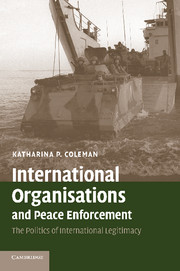Book contents
- Frontmatter
- Contents
- List of maps
- List of figures
- List of tables
- Acknowledgements
- List of abbreviations
- 1 Introduction
- 2 States, international organisations, and legitimacy: a theoretical framework
- 3 Peace enforcement through sub-regional organisations: the Economic Community of West African States and Operation Liberty in Liberia
- 4 Peace enforcement through sub-regional organisations: the Southern African Development Community and Operation Sovereign Legitimacy in the Democratic Republic of Congo
- 5 Peace enforcement through sub-regional organisations: the Southern African Development Community and Operation Boleas in Lesotho
- 6 Peace enforcement through a military alliance: the North Atlantic Treaty Organisation and Operation Allied Force in Kosovo
- 7 Peace enforcement through a global organisation: the United Nations and INTERFET in East Timor
- 8 Conclusion
- Epilogue: UN intervention in Lebanon
- Appendix: Summary of interviews conducted
- Bibliography
- Index
2 - States, international organisations, and legitimacy: a theoretical framework
Published online by Cambridge University Press: 10 November 2010
- Frontmatter
- Contents
- List of maps
- List of figures
- List of tables
- Acknowledgements
- List of abbreviations
- 1 Introduction
- 2 States, international organisations, and legitimacy: a theoretical framework
- 3 Peace enforcement through sub-regional organisations: the Economic Community of West African States and Operation Liberty in Liberia
- 4 Peace enforcement through sub-regional organisations: the Southern African Development Community and Operation Sovereign Legitimacy in the Democratic Republic of Congo
- 5 Peace enforcement through sub-regional organisations: the Southern African Development Community and Operation Boleas in Lesotho
- 6 Peace enforcement through a military alliance: the North Atlantic Treaty Organisation and Operation Allied Force in Kosovo
- 7 Peace enforcement through a global organisation: the United Nations and INTERFET in East Timor
- 8 Conclusion
- Epilogue: UN intervention in Lebanon
- Appendix: Summary of interviews conducted
- Bibliography
- Index
Summary
Peace enforcement operations are understudied as a theoretical phenomenon. They have received intense scrutiny from analysts seeking to draw policy guidelines for future operations, but not from international relations theorists enquiring into the nature of the contemporary international system. Nevertheless, these novel and high-profile operations offer a fertile ground for developing international relations theory. Since peace enforcement operations are risky, costly, and controversial, states can be expected to choose their intervention strategies with great care. The fact that virtually all contemporary peace enforcement operations are launched through an international organisation suggests that states see these organisations as playing a critical role in these operations. Yet no international organisation has the resources to launch a peace enforcement operation on its own, or even to significantly decrease its costs and risks to the states that undertake it. Why, then, are international organisations so central to contemporary peace enforcement operations?
This book recognises that states are concerned about how the international community will perceive their interventions. It contends that states launch peace enforcement operations through international organisations because they recognise that these organisations act as gatekeepers to legitimacy in the contemporary international system. This chapter lays the theoretical groundwork for this argument. It begins by elucidating the concept of international legitimacy and explaining its significance to contemporary states. It then offers a theoretical argument for why international organisations affect the legitimacy of peace enforcement operations.
- Type
- Chapter
- Information
- International Organisations and Peace EnforcementThe Politics of International Legitimacy, pp. 19 - 72Publisher: Cambridge University PressPrint publication year: 2007



